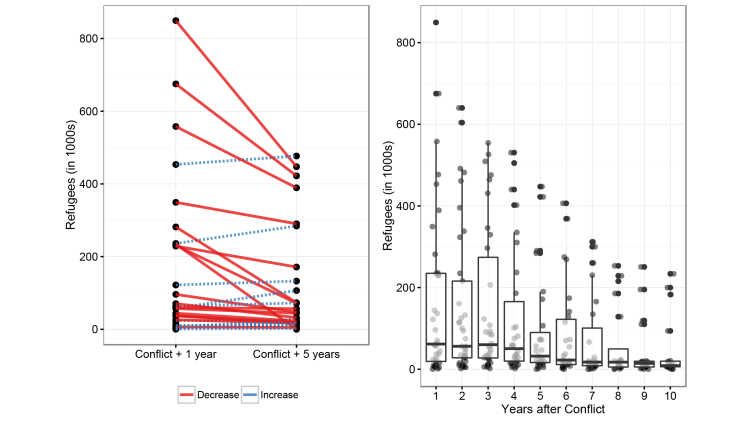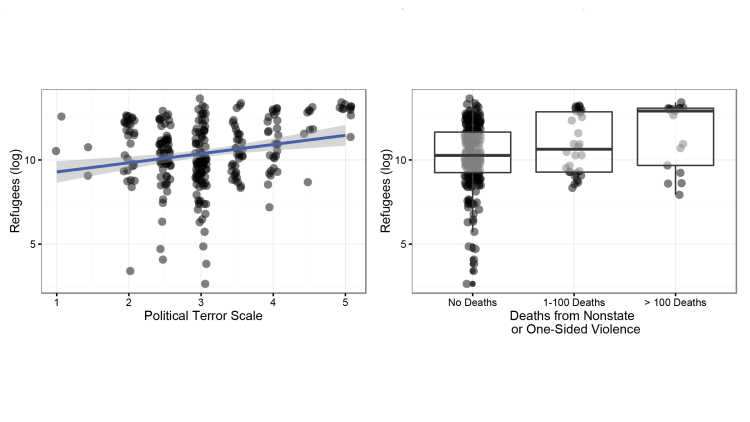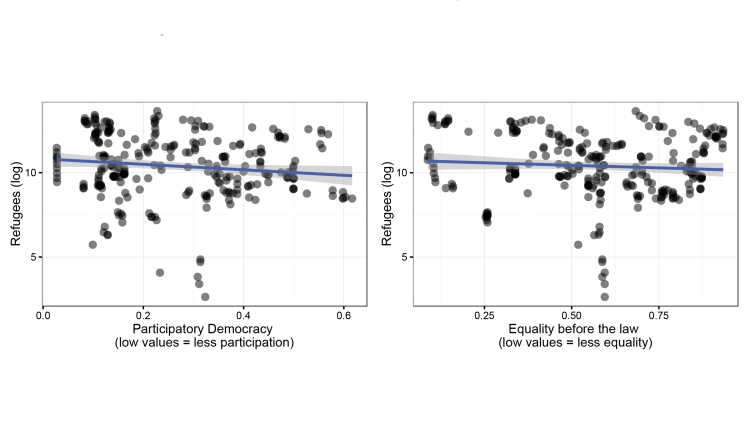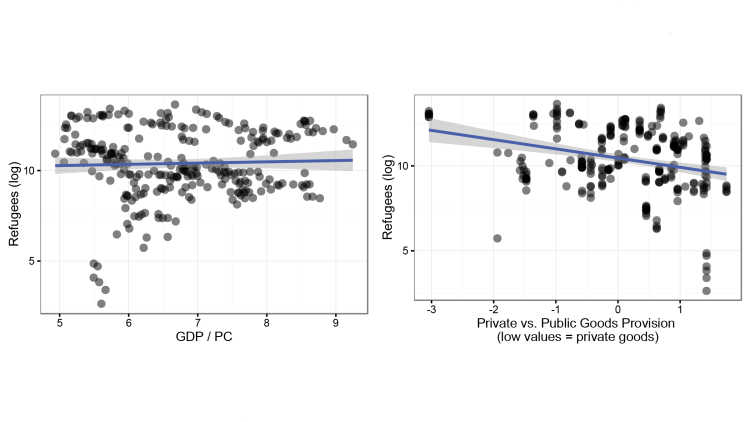- Home
- Publications
- GIGA Focus
- Fleeing the Peace: Emigration after Civil War
GIGA Focus Global
Fleeing the Peace: Emigration after Civil War
Number 2 | 2016 | ISSN: 1862-3581

Flight and emigration often continue despite the formal termination of war and significant international peace-building efforts because the international community often fails to address the root causes of flight and migration. Donors primarily aim at mitigating the direct consequences of war and pacifying elite groups rather than delivering peace dividends that benefit the broader population.
The decision to flee during peacetime often closely relates to structural problems. Where peace is reduced to the mere absence of war and is of low quality, it is difficult to overcome major social cleavages. Thus the reasons for emigration persist.
Three factors shape the quality of peace across specific contexts: (i) the level of violence beyond the recurrence of war, (ii) the degree of access to justice and political participation beyond a formal change of the political regime, and (iii) the generation of social and economic prospects and social mobi lity.
Nepal and El Salvador are illustrative examples of the interplay of these factors at the interface between state and society. In these countries, state repression and other forms of violence persist, the political system is dominated by traditional elites or those that fought the war, and youths and former combatants lack prospects for the future.
Policy Implications
International actors need to adapt their strategies in post-war societies in a way that they support the broader population and not just the interests of the elite. While the termination of war and the introduction of democratisation might be first steps in this direction, they alone do not automatically lead to sustainable quality peace.
The 2015 European Migrant Crisis: New Levels of an Old Phenomenon
In 2015 the rising number of refugees arriving in the European Union was primarily driven by the Syrian civil war. Millions of Syrians escaped Bashar al-Assad’s military advances and clashes between the many non-state armed militias in the country. However, even in countries where civil war has (formally) ended, not all refugees return, and emigration does not come to a halt. Afghanistan, a so-called post-conflict society, is a case in point: despite the Taliban regime being removed in 2001 and internationally sponsored presidential elections being held in 2004, millions of Afghan migrants continue to settle in neighbouring countries or make their way to Europe – not least because Taliban attacks against civilians remain a significant threat.
Afghanistan, however, is not an exception. There are numerous other countries that experience significant levels of emigration in the aftermath of civil war. In some states refugee levels have dropped following citizens’ return to their home countries, such as in Mozambique or Angola (see Figure 1). Many post-war societies, however, see their citizens leave in large numbers despite organised combat coming to an end and international and domestic reconstruction efforts beginning – something which has often perplexed Western politicians. Commenting on the ongoing arrival of Afghan migrants to Germany and the European Union in 2015, the German federal minister of the interior, Thomas de Maizière, argued that because the international community had invested significant amounts of foreign aid in the country for post-war reconstruction and institutional reforms “The young generation and the middle class families ought to stay in their country and help build it” (28.10.2015). But why do so many citizens in post-war societies continue to flee during peacetime?

Emigration from Post-War Societies
The phenomenon of forced or voluntary outward migration is not new, but the number of people not living in their country of birth has reached a record high. In June 2015 the United Nations High Commissioner on Refugees (UNHCR) reported that for the first time since World War II, more than 50 million people worldwide had been forcibly displaced, which accounts for roughly a quarter of the world’s total number of migrants residing outside their countries of birth. In fact, these numbers (and the figures we report in our cross-national comparisons and graphics below) are conservative estimates. The true number of refugees is masked by the UNHCR’s definition of “refugee,” which only pertains to those that officially seek political asylum abroad. People who leave their home countries without officially declaring themselves political refugees are not included in refugee statistics. But since they might nevertheless leave because of the reasons we list below, the true number of post-war emigrants is likely to exceed the figures reported by the UNHCR.
The boundaries between voluntary economic migration and forced displacement are blurred. Post-war states possess many of the push factors that are deemed to contribute to high levels of migration, such as weak national economies, political instability, predatory and corrupt political elites, and widespread human rights abuses (Castles 2013). The motivation to emigrate is based on a mix of structural and individual factors. Three interlinked factors in particular determine why some post-war societies see large degrees of outward migration while others do not. Those factors are related to the quality of post-war peace, institutions, and livelihoods.
Emigration and the Quality of Post-War Peace
An obvious explanation for varying levels of outward migration from post-war societies is that the quality of post-war peace differs between countries. For instance, people in states that continue to experience violence after war has ended – either in the form of direct attacks against themselves or potential violence against themselves (e.g. the looming threat of state-sponsored disappearances) – are more likely to leave the country in order to seek physical protection (Davenport, Moore, and Poe 2003).
Crucially, post-war violence takes many forms, which are only indirectly linked to the battle-related violence that occurs during war itself. The violence perpetrated in civil wars also varies, with instances of one-sided violence against civilians, sexual violence, torture, disappearances, private conflicts, violent crime, and revenge, inter alia, accompanying the direct confrontations between warring parties. In some cases, for example, underpaid state-sponsored militias have raped women and stolen cattle or other property as payment. Ultimately, these manifestations of violence are not necessarily related to a civil war’s “master cleavage” (Kalyvas 2005) of controlling a government or territory, but are often closely interlinked without any clear-cut division.
As a consequence, such acts of violence can persist even after war has formally ended with the signing of a peace accord. Even if full relapses into civil war do not occur, many post-war societies enter a grey zone of “neither peace nor war,” where violence remains a daily experience for the majority of the population. Similarly, although parties may not remobilise, some may use criminal activities to destabilise a newly elected post-war government (Westendorf 2015). Since people flee violence, and because different forms of violence often continue after civil war, people will try to seek physical security by leaving their respective countries and seeking refuge abroad (see Figure 2).
The left panel of Figure 2 plots the relationship between political terror and refugee levels. The upward slope of the regression line indicates that as the level of political terror increases, the number of refugees (plotted in a logarithmic scale on the y-axis) also grows. The right panel plots the intensity of non-state and one-sided violence against refugee levels. Even though the data is not as clear as that in the left panel, we can observe a higher number of refugees in post-war country-years with high levels of non-state and one-sided violence than in those countries with lower levels of civilian victimisation and fatalities from non-state conflicts.

Emigration and the Quality of Post-War Institutions
Another factor for why people continue to emigrate after war is the low quality of post-war institutions. The need for institutional reform (i.e. to reconstruct or to establish formal state institutions to manage conflict without the use of force) is a common feature in almost all post-war states. Often, these reforms address the lack of inclusion in state institutions of groups that have long been marginalised and discriminated against and aim to increase these groups’ political participation through implementing democratisation processes, power-sharing governments, or quota systems within civil administration. The underlying assumption is that reforming state institutions makes governance more inclusive and this, in turn, should have a pacifying effect. A second major field of reform in the aftermath of war is transitional justice, which covers human rights violations. Such institutional reforms are often designed and implemented by a variety of international actors involved in the post-war reconstruction process, such as the UN and bilateral development assistance organisations. However, the evidence shows that institutional reforms often do not work the way they are supposed to. This is because pre-war institutions do not just fade away but also influence the paths of reform. Moreover, international blueprints for institutional reforms are disconnected from local contexts and often fail to address relevant societal divisions (Ansorg and Kurtenbach 2016).
Institutional reforms take time to be implemented and work as designed – as was the case with transitional justice. Perpetrators of gross human rights violations can only be prosecuted once they have lost their political and economic power. Other institutional reforms need a long-term perspective and high levels of political commitment in order to be implemented in a non-superficial manner. The failure of important institutions like the judiciary or the state security sector may push emigration. First, without at least some minimal form of justice, perpetrators of war crimes often continue to execute strong influence in post-war societies, and victims are forced to live side-by-side with those that carried out gross human rights violations. Even if former warring parties do not remobilise in the post-interim period, victims may emigrate due to fears of personal violence, reprisals, or revenge. Second, people might also have strong incentives to leave a post-war country (or remain abroad) if the judicial system does not provide the mechanisms required to manage conflicts according to existing rules, and if they are not guaranteed fair access to law institutions, equal treatment before the law, or secure property rights. Third, people will also be more inclined to emigrate or remain abroad if they are deprived of opportunities to participate politically. One of the main drivers of civil wars is the political marginalisation of certain social groups, which may continue even after conflict has ended.

The data from the V-Dem project (Coppedge et al. 2015b) cross-nationally illustrate the second and third of these dynamics in Figure 3. The left panel plots the relationship between V-Dem’s measure of equality before civil law and post-war refugee levels in country-years after civil war. The relationship is weak, and the correlation is not statistically significant – though it is negative. The relationship between participatory democracy and post-war refugee levels is somewhat clearer and statistically significant: the higher countries score on V-Dem’s measure of participatory democracy (i.e. the higher citizens’ possibilities are to directly participate in politics through, for example, sub-nationally elected bodies or civil society organisations), the lower their refugee levels.
Emigration and the Quality of Post-War Livelihoods
A final explanation for varying levels of outward migration from post-war societies is related to the quality of post-war livelihoods. The lack of social and economic opportunities is a key driver of both internal and outward migration, independent of whether a country has recently experienced violent civil war or not. But there is reason to believe that this mechanism is exacerbated in post-war environments. First, ex-combatants often enter the labour market following their participation in disarmament, demobilisation, and reintegration (DDR) processes. Thus, there is an even greater demand for jobs in war-devastated economies, which are characterised by a distinct lack of employment opportunities. Given the pressure to find jobs in labour markets with very few possibilities, individuals develop strong incentives to leave their respective countries. Second, youth are at high risk of being drawn into violence or other “anti-social” behaviour in most post-war societies as access to economic resources is often controlled by generations that fought in wars and their respective clientele networks. Although youths are often better educated than their parents, decent work is largely unavailable in weak and unstable post-war states. In these contexts “emigration may work as a safety valve” (Urdal 2006: 624).

Figure 4 illustrates the relationship between quality of post-war livelihoods and levels of post-war refugees. The left panel plots the relationship between GDP per capita and refugees in all post-war country-years. It shows that there is, in fact, a positive relationship between GDP per capita and levels of post-conflict refugees, albeit a very weak one. Even though this runs somewhat counter to the argument made above, it does make sense: individuals looking to leave their countries require a minimum amount of capital to pay for transportation and food, which means that emigration is only possible for those with access to this minimum amount of capital. In the right panel we plot the relationship between the extent to which a country provides private goods versus public goods. The idea behind this plot is that the preferential provision of many private goods (e.g. electricity, water, education, and health care) to small segments of populations causes people to leave their countries. This proposition is supported by our findings, which reveal that as the level of public goods provision increases, refugee levels drop.
However, these general explanations and cross-national empirical trends vary in their concrete manifestations. The cases of Nepal and El Salvador illustrate the complex interactions between these individual explanations and put into context the cross-national trends identified in the previous section.
Nepal: Post-War Emigration as a Stabilising Factor
Nepal has seen a constant increase in forced migration since the end of the People’s War in 2006. According to UNHCR reports, there were 4,189 refugees from Nepal in 2007 and 8,109 in 2012; similar numbers appear for economic migrants, who provide roughly 30 per cent of the country’s GDP through remittances (Government of Nepal 2014). During Nepal’s civil war, the Maoist rebel movement capitalised on the country’s increasing economic and political inequality and mobilised marginalised groups with promises of increased political representation and fairer land distribution. In 2006 the warring parties signed a peace agreement, which stipulated that elections would be held for the Constituent Assembly. The Maoists won this vote, but polarisation in the Constituent Assembly over the issue of federalism led to the body’s dissolution in 2012. The Constitution was only promulgated in September 2015 after the urgency to begin reconstruction following the April 2015 earthquake had fastened a long-stalled constitution-making process. An analysis of the three factors outlined above reveals a specific mix.
Although the Maoist rebels disarmed after 2006, physical insecurity and violence has been a common feature of Nepal’s post-war period. In 2007 non-state conflict between Maoist cadres and members of the Madhesi community in the Tarai plains resulted in over 30 deaths. The violence erupted once it became apparent that the post-war interim government would not fully address the demands of marginalised communities in the institutional reform process. The Tarai is also home to the latest episode of violence, where splits over the Constitution has sparked clashes between Madhesis and security forces, killing at least 50 people as of April 2016.
A significant amount of post-war violence has occurred in the Tarai, and the majority of emigrants are men from low-income families in the Tarai (Government of Nepal 2014). However, there is no clear link between these two phenomena. Instead, this highlights a complex relationship between post-war violence and migration, which can only be fully understood by taking other “qualities” into account. In Nepal post-war violence is not an explanation for outward migration from the Tarai; rather, both migration and violence are consequences of larger underlying problems, such as a lack of institutional representation and limited economic opportunities for Tarai communities.
On paper Nepal’s institutional reform process is a success vis-à-vis other post-war societies. For instance, it has seen relatively high levels of democratisation and a successful rebel-to-party transformation process. Nevertheless, the country’s institutional reforms were not without faults. First, a comprehensive transitional justice process had been lacking due to the disinterest of the parties. For instance, even though the peace agreement called for the creation of a truth and reconciliation commission in 2006, it was not implemented until 20140. Second, although Nepal’s institutional reform process successfully brought Maoist rebels into several power-sharing governments, disadvantaged Tarai groups argue that they are becoming increasingly marginalised and that promised reforms have not materialised.
As indicated, the failure of institutional reform to account for the grievances of the Tarai‘s Madhesi community in particular is one explanation for emigration from post-war Nepal. Early on in the peace process, refugees identified the lack of transitional justice mechanisms as a reason for why they were forced to flee. They also feared reprisals by cadres responsible for human rights violations during the war, who were still roaming freely in the post-war period. Post-war institutional reform accelerated the Madhesi’s and other groups’ grievances about political marginalisation. In 2007 and 2015 this lack of institutional representation resulted in violence – though such marginalisation is also a driver of emigration. Typically, “desirable jobs in the civil service, army, and judiciary” have been assumed by high-caste Hindu elites (caste and ethnicity are reliable proxies for access to wealth), which has led Tarai groups to often seek employment abroad (Clewett 2015).
This discussion links to our final argument that Nepal’s peace process has thus far inadequately addressed the economic root causes of the war, which include widespread poverty, landlessness, and economic inequality between castes and ethnic groups. Creating economic prospects in Nepal has been sidelined, and opportunities for the demobilised Maoist combatants who entered the job market in 2013 are especially scarce. Unsurprisingly, economic emigration has been an option for many ex-combatants – the majority of whom are today working on construction sites in Dubai or Qatar. One interviewed Nepalese civil society leader joked that the two employment opportunities for ex-combatants were either “militia or Malaysia.” The phenomenon of ex-combatant emigration is among the central reasons for why demobilised actors have not engaged in criminal activities or remobilised – that is, it has helped to reduce the risk of violence and insecurity. Considered together with the fact that post-war violence and insecurity are drivers of emigration, ex-combatant emigration from Nepal highlights the difficulties in establishing a clear link between the quality of post-war societies and migration.
El Salvador: Emigration as a Safety Valve
Even more than 20 years after the war, over 20 per cent of the Salvadorian population live outside of the country. According to UNHCR documents, there were 26,124 refugees from El Salvador in 1992. However, while official refugee numbers have declined, the number of official migrants (the majority of whom live in the United States) has increased since the war. El Salvador has a tradition of migration, which was primarily on a seasonal basis and within the country or region. But the civil war (1980–1992) saw an increasing number of people leave the country. The money they send home has become an increasingly important source for the Salvadorian economy: remittances have climbed from 1.4 per cent of GDP in 1980 to 11.7 per cent in 1992 to 16.6 per cent in 2014 according to the World Bank. However, the continuous outward migration from El Salvador since the cessation of war is surprising given that the Salvadorian peace process is considered one of the few success stories of war-to-peace transition. After demobilising, the Frente Martí de Liberación Nacional (FMLN) – the armed opposition – formed a political party under the same name and saw its candidates win the 2009 and 2013 presidential elections. Today, most of the Salvadorian population lives in communities with an FMLN mayor. Despite these positive steps in the post-war era, serious and long-standing problems and cleavages remain.
During the early post-war period, the levels of violence decreased. Nevertheless, during the second half of the 1990s, the then right-wing government and the mass media started to sensationalise an increase in social and criminal violence. Although interpersonal violence was indeed increasing at the turn of the century, public debate exaggerated the extent to which that was happening and attributed it to poor young males (Oettler 2011). The government and media advocated zero-tolerance policies, which reproduced traditional counter-insurgency policies, albeit in a post-war context. The result was a severe escalation of violence between gangs and state security forces. The close link between violence and emigration became evident when an unofficial truce between the two major street gangs and the government ended in 2015. Violence reached unprecedented levels and many people in El Salvador felt as if they had been transported back to wartime. A lack of physical integrity remains an important driver of emigration.
The inability of the Salvadorian state and its institutions to reduce violence is closely related to post-war institutional reform. The Chapultepec Peace Accords established a series of commitments to reform the country’s political institutions. For instance, the electoral system (which was established in the midst of war) was amended and allowed former guerrilla groups to participate. The security sector also underwent major reform, which saw the United Nations monitor the DDR process and the US government and European donors support the establishment of a new civilian police force composed of former military police, former rebels, and new recruits. While external observers saw a lot of potential in the new police force, the lack of political will among the traditional elites undermined the implementation of the related reforms early on. Right-wing governments used these high levels of insecurity to block or even roll back security sector reforms. Public security was militarised, and the new division of labour between the civilian police and the army was blurred. As a consequence, repressive strategies were overwhelmingly employed to tackle crime and violence. The Salvadorian justice system is not any better.
FMLN presidents have by and large followed these public security policies. Despite claiming to prioritise violence prevention (as outlined in a 2012 violence prevention strategy), everyday practice still reflects repressive policies. This can be attributed to (i) the fact that the FMLN does not have a parliamentary majority and (ii) ongoing media campaigns that are nurturing a moral panic about gang violence. Although post-war emigration from El Salvador is a complex phenomenon, the inability of dysfunctional central institutions to deal with violence without resorting to repression is at least an indirect factor.
A widespread lack of social and economic prospects for decent livelihoods is another factor behind emigration from El Salvador. The peace agreement did not change the economic development model. Currently, over 50 per cent of the country’s economically active population earns less than the minimum wage; today, its purchasing power is only 30 per cent of what it was in 1970. The richest quintile of the population gets 50 to 60 per cent of the income, while the poorest quintile receives 3.5 per cent. At the same time, the Salvadorian tax ratio is only 13.6 per cent, which is low even compared to other Latin American countries. As a consequence, any government looking to improve the situation faces serious difficulties due to a lack of resources. This social inequality is maintained by right-wing politicians and the Salvadorian business elite, who control the media and the economy and are thus able to prevent any tax reforms or other initiatives that seek to bring about substantial change. In this context outward migration is a safety valve. Remittances from both legal and illegal migrants have become the most important source of external revenues, and the government has no interest in changing this.
To summarise, it is evident that post-war migration from El Salvador is heavily driven by the interaction of three factors: violence, dysfunctional institutions, and a lack of viable social and economic prospects.
Peace Dividends for All
Peace is a complex phenomenon and consists of more than the absence of war. While the end of war might represent a window of opportunity, the establishment of inclusive post-war orders remains a long-term endeavour. The analysis of ongoing emigration from post-war societies provides empirical evidence of the interplay between the necessity (i) to reduce violence beyond the mere termination of organised combat, (ii) to reform institutions, and (iii) to provide people with social and economic prospects. International actors should thus include these measures in order to develop more holistic strategies for post-war societies.
Nepal exemplifies the complexity of the interaction between the different drivers of emigration discussed above. There the eruptions of violence and the increasing levels of emigration that occurred after the war were both expressions of frustration with the lack of institutional representation and economic opportunities. The interplay between the three factors is also evident in El Salvador, where the lack of economic reforms is a key driver of non-state violence and state repression is used to maintain the status quo of inequality. Moreover, reforms of the country’s political institutions have failed to provide security or increase participation among the socially excluded.
While post-war international strategies are getting ever more complex, they are still not comprehensive given their use of sequencing instead of holism. To reduce violence, international agencies and donors initially introduce projects that usually focus on DDR processes. Although these are important, they are not sufficient. Security is important not just for ex-combatants and elite groups but also for society as a whole. Hence, programmes for violence prevention and victim support should be implemented from the start and not just after post-war aid has been transformed into “normal” development aid.
Reforming institutions is a long-term and often contentious process. Rarely do blueprints travel, and pre-war institutions do not vanish. Support for institutional reform has to be based on the knowledge of pre-war institutions and the main cleavages in post-war societies. Only then will institutional reforms cause less tensions and will the reformed institutions be able to displace violence as a means to solve conflicts.
Last but not least, sustainable livelihoods – especially for young people – are a necessary condition for peace and for curtailing emigration. Changing priorities from mere competitiveness to sustainable livelihoods, decent work, and better legal regulation of migration might be the best instruments for creating sustainable peace and curbing outward migration.
If the international community pledges to combat the root causes of the current “refugee crisis,” it should be aware that war is rather a symptom of these root causes and that fundamental changes might be necessary to convince refugees to return.
Footnotes
References
Ansorg, Nadine, Felix Haass und Julia Strasheim, (2016), Police Reforms in Peace Agreements, 1975–2011: Introducing the PRPA dataset, in: Journal of Peace Research, http://jpr.sagepub.com/content/early/2016/04/26/0022343316628932.abstract.
Castles, Stephen (2013), The Forces Driving Global Migration, in: Journal of Intercultural Studies, 34, 2, 122-140.
Clewett, Paul (2015), Redefining Nepal: Internal Migration in a Post-Conflict, Post-Disaster Society, in: Migration Information Source, www.migrationpolicy.org/article/redefining-nepal-internal-migration-post-conflict-post-disaster-society.
Coppedge, Michael, John Gerring, Staffan I. Lindberg, Jan Teorell et al. (2015a), Varieties of Democracy: Methodology, Gothenburg: Varieties of Democracy (V-Dem) Project. —, (2015b), Varieties of Democracy: V-Dem [Country-Year/Country_date] Dataset v5. Varieties of Democracy (V-Dem) Project.
Davenport, Christina, Will Moore und Steven Poe (2003), Sometimes You Just Have to Leave: Domestic Threats and Forced Migration, 1964-1989, in: International Interactions, 29, 1, 27-55.
Eck, Kristine, und Lisa Hultman (2007), One-Sided Violence Against Civilians in War. Insights from New Fatality Data, in: Journal of Peace Research, 44, 2, 233-246, doi:10.1177/0022343307075124.
Government of Nepal, GoN (2014), National Population and Housing Census 2011: Social Characteristics Tables, Kathmandu, Nepal: National Planning Commission Secretariat. Central Bureau of Statistcs.
Sundberg, Ralph, Kristine Eck und Joakim Kreutz (2012), Introducing the UCDP Non-State Conflict Dataset, in: Journal of Peace Research, 49, 2, 351-362, doi:10.1177/0022343311431598.
Urdal, Henrik (2006), A Clash of Generations? Youth Bulges and Political Violence, in: International Studies Quarterly, 50, 607-629.
Westendorf, Jasmine-Kim (2015), Why Peace Processes Fail: Negotiating Insecurity After Civil War, Boulder und London: Lynne Rienner Publishers.
Wood, Reed, und Mark Gibney (2015), Political Terror Scale, 1976-2012, in: Human Rights Quarterly, 35, 2, 367-400.
General Editor GIGA Focus
Editor GIGA Focus Global
Research Programmes
How to cite this article
Haaß, Felix, Sabine Kurtenbach, and Julia Strasheim (2016), Fleeing the Peace: Emigration after Civil War, GIGA Focus Global, 2, Hamburg: German Institute for Global and Area Studies (GIGA), http://nbn-resolving.de/urn:nbn:de:0168-ssoar-46912-0
Imprint
The GIGA Focus is an Open Access publication and can be read on the Internet and downloaded free of charge at www.giga-hamburg.de/en/publications/giga-focus. According to the conditions of the Creative-Commons license Attribution-No Derivative Works 3.0, this publication may be freely duplicated, circulated, and made accessible to the public. The particular conditions include the correct indication of the initial publication as GIGA Focus and no changes in or abbreviation of texts.
The German Institute for Global and Area Studies (GIGA) – Leibniz-Institut für Globale und Regionale Studien in Hamburg publishes the Focus series on Africa, Asia, Latin America, the Middle East and global issues. The GIGA Focus is edited and published by the GIGA. The views and opinions expressed are solely those of the authors and do not necessarily reflect those of the institute. Authors alone are responsible for the content of their articles. GIGA and the authors cannot be held liable for any errors and omissions, or for any consequences arising from the use of the information provided.












